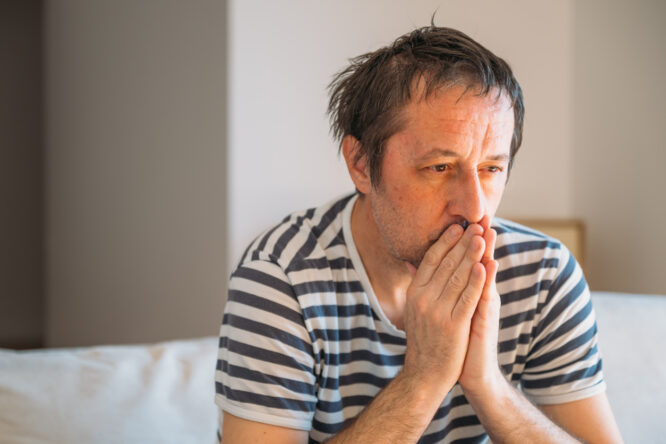You don’t have to be awake all night worrying about everything or suffering from panic attacks to have anxiety.

More often than not, it worms its way into everyday behaviours, the kind that seem harmless or even responsible on the surface. You might think you’re just being thoughtful, cautious, or someone who “likes to be prepared.” However, in reality, those habits are actually quiet ways your brain tries to keep things feeling safe. If you’ve ever had a hunch that something deeper might be going on behind your daily routines, here are some little things you might be doing that point to anxiety.
1. Overthinking simple decisions

Whether it’s choosing what to wear or deciding which route to take to the shop, small decisions can feel like high-stakes choices. You might bounce between options, worry you’ll regret the one you pick, or feel mentally exhausted after making what should be a quick call.
You’re not being indecisive for the fun of it. In reality, it’s your brain trying to anticipate every possible outcome to avoid something going wrong. Even if it’s just dinner plans, the pressure to “get it right” can leave you second-guessing yourself long after the decision’s made.
2. Constantly needing reassurance

You might find yourself checking in with friends or coworkers more than usual—“Are we still good?”, “Did I do that right?”, or “Was that okay?” might be common phrases for you. On the surface, it looks like careful communication, but underneath, it’s anxiety looking for safety.
Even after getting positive feedback, that uneasy feeling can linger. Anxiety doesn’t always believe the first “yes, everything’s fine,” so it asks again, just to be sure. It’s not about being dramatic, but about calming that ever-present doubt in your mind.
3. Replaying conversations in your head

You said something earlier that felt normal in the moment, but hours later, it’s stuck on repeat in your brain. You’re wondering if it came out wrong, if you offended someone, or if they secretly thought you were weird.
All that social over-analysis is anxiety’s way of checking for hidden danger. Even when nothing bad happened, your brain can’t quite let go. It keeps scanning the moment like it’s looking for a threat that wasn’t there to begin with.
4. Avoiding phone calls

You might stare at your ringing phone and feel your stomach drop. Even if it’s someone you know, the idea of having to speak on the spot, without preparation, feels oddly intense.
Phone anxiety often comes from a fear of unpredictability. There’s no time to plan your response, no visual cues, and no clear way out if you get overwhelmed. Texts feel safer because they give you space to breathe and think before replying.
5. Cancelling plans last minute

You meant to go. You even looked forward to it! But now the day has come, and your chest is tight, your brain is racing, and it all suddenly feels like too much. So you send a polite message and back out.
That’s not you being flaky or unreliable; it’s your nervous system hitting overload. Social situations, even ones you enjoy, can sometimes trigger that need to retreat. Afterwards, you might feel guilty or sad, but in the moment, cancelling felt like the only option.
6. Apologising way too often

You say “sorry” when you ask a question, when you bump into someone slightly, or even when someone else makes a mistake. It’s become almost automatic—and often, you don’t even realise you’re doing it.
All that over-apologising is often rooted in a deep desire not to upset anyone. Anxiety convinces you that you’re always on the edge of being too much or causing discomfort, so you preemptively say sorry as a way of keeping peace, even when you’ve done nothing wrong.
7. Avoiding eye contact

Looking someone in the eye during conversation can feel surprisingly uncomfortable. You might glance away, focus on your hands, or zone out while trying to look engaged from a safe distance.
For many people with anxiety, eye contact feels intense or exposing. It’s like being too “seen” in that moment. Avoiding it doesn’t necessarily make you aloof; it’s your brain trying to protect you from feeling vulnerable or overwhelmed during social interactions.
8. Planning obsessively for everything

You’re the person who brings an umbrella on sunny days “just in case,” checks the bus schedule three times, or carries a backup charger, tissues, and snacks in every bag. It might seem like you’re just responsible, but underneath it all, there’s a need to feel in control.
When anxiety is running the show, planning becomes a form of emotional safety. You’re not just being cautious; you’re mentally rehearsing every scenario so nothing catches you off guard. It brings temporary calm, but can also become exhausting over time.
9. Being overly polite to the point of discomfort

You nod even when you disagree, laugh when something’s not funny, and constantly prioritise other people’s comfort over your own. You may find it nearly impossible to say no, even when it’s what you really want to do.
It’s not just good manners, either. In fact, it’s often anxiety masking itself as extreme politeness. You might be terrified of causing offence, being disliked, or creating tension. So you play nice, even when it leaves you feeling overlooked or drained.
10. Feeling drained after social interactions

Whether it’s a night out or a casual catch-up, you come home and feel like you’ve been hit by a truck. Even if everything went well, your body and mind feel completely spent.
Anxiety can turn socialising into a performance. You were probably overthinking every move, reading facial expressions, and working overtime to seem “normal.” That constant mental chatter uses up a lot of energy, and when it’s over, you crash.
11. Procrastinating even tiny tasks

You know it’ll only take five minutes, but something about starting feels impossible. You put it off, distract yourself, and tell yourself you’ll do it later, but later keeps moving.
Procrastination linked to anxiety isn’t about laziness. It’s usually the fear of doing it wrong, making a mistake, or feeling overwhelmed before you’ve even begun. The task isn’t the problem; the emotions around it are what make it feel like a mountain.
12. Struggling when plans change suddenly

You were mentally prepped for things to go one way—and then someone cancels, the venue changes, or the schedule gets all wonky. It’s minor to other people, but for you, it throws everything out of sync.
Anxiety loves predictability. Sudden changes can feel destabilising, even if they’re objectively fine. It takes time to recalibrate and feel settled again, which not everyone else will understand if they don’t experience that internal wobble themselves.
13. Hesitating to express your needs

You often hold back from asking for help, clarifying something, or voicing a preference because you don’t want to come across as demanding or inconvenient. You’d rather manage quietly than risk being seen as difficult.
But this silence doesn’t mean you don’t have needs; it’s anxiety convincing you that advocating for yourself is risky. The fear of judgement or rejection makes it feel safer to stay quiet, even when it leaves you feeling unseen or unfulfilled.
14. Carrying tension you didn’t notice until someone points it out

Your shoulders are tight, your jaw is clenched, and your hands are fidgeting, but you don’t notice until someone gently says, “You okay?” That constant physical tension becomes your baseline, so much so that you forget it’s even there.
Chronic tension is one of anxiety’s quietest signals. Your body’s stuck in fight-or-flight mode, preparing for something that never quite arrives. It’s only when you pause—or someone else points it out—that you realise just how tightly you’ve been holding yourself together.
Don’t suffer in silence if this is you—Mind UK has a great list of resources and tips for self-management of anxiety that you might find helpful.




